
Gloria Gaynor is an American singer, best known for the disco era hits "I Will Survive" (1978), "Let Me Know " (1979), "I Am What I Am" (1983), and her version of "Never Can Say Goodbye" (1974).

Otto Abels Harbach, born Otto Abels Hauerbach was an American lyricist and librettist of nearly 50 musical comedies and operettas. Harbach collaborated as lyricist or librettist with many of the leading Broadway composers of the early 20th century, including Jerome Kern, Louis Hirsch, Herbert Stothart, Vincent Youmans, George Gershwin, and Sigmund Romberg. Harbach believed that music, lyrics, and story should be closely connected, and, as Oscar Hammerstein II's mentor, he encouraged Hammerstein to write musicals in this manner. Harbach is considered one of the first great Broadway lyricists, and he helped raise the status of the lyricist in an age more concerned with music, spectacle, and stars. Some of his more famous lyrics are "Smoke Gets in Your Eyes", "Indian Love Call" and "Cuddle up a Little Closer, Lovey Mine".
Mary Rodgers was an American composer, screenwriter, and author. She wrote the novel Freaky Friday, which served as the basis of a 1976 film starring Jodie Foster, for which she wrote the screenplay, as well as three other versions. Her best-known musicals were Once Upon a Mattress and The Mad Show, and she contributed songs to Marlo Thomas' successful children's album Free to Be... You and Me.

Rodgers and Hammerstein was a theater-writing team of composer Richard Rodgers (1902–1979) and lyricist-dramatist Oscar Hammerstein II (1895–1960), who together created a series of innovative and influential American musicals. Their musical theater writing partnership has been called the greatest of the 20th century.

Henry Louis Reginald De Koven was an American music critic and prolific composer, particularly of comic operas.
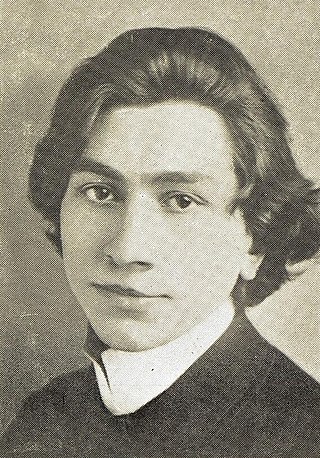
Charles Rudolf Friml was a Czech-born composer of operettas, musicals, songs and piano pieces, as well as a pianist. After musical training and a brief performing career in his native Prague, Friml moved to the United States, where he became a composer. His best-known works are Rose-Marie and The Vagabond King, each of which enjoyed success on Broadway and in London and were adapted for film.
Mack David was an American lyricist and songwriter, best known for his work in film and television, with a career spanning the period between the early 1940s and the early 1970s. David was credited with writing lyrics or music or both for over one thousand songs. He was particularly well known for his work on the Disney films Cinderella and Alice in Wonderland, and for the mostly-English lyrics through which Édith Piaf's signature song "La Vie en rose" gained much of its familiarity among native speakers of English.
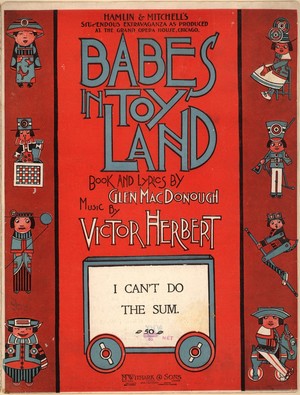
Babes in Toyland is an operetta composed by Victor Herbert with a libretto by Glen MacDonough, which wove together various characters from Mother Goose nursery rhymes into a musical extravaganza. Following the extraordinary success of their stage musical The Wizard of Oz, which was produced in New York beginning in January 1903, producer Fred R. Hamlin and director Julian Mitchell hoped to create more family musicals. MacDonough had helped Mitchell with revisions to the Oz libretto by L. Frank Baum. Mitchell and MacDonough persuaded Victor Herbert to join the production. Babes in Toyland features some of Herbert's most famous songs – among them "Toyland", "March of the Toys", "Go to Sleep, Slumber Deep", and "I Can't Do the Sum". The theme song "Toyland", and the most famous instrumental piece from the operetta, "March of the Toys", occasionally show up on Christmas compilations.
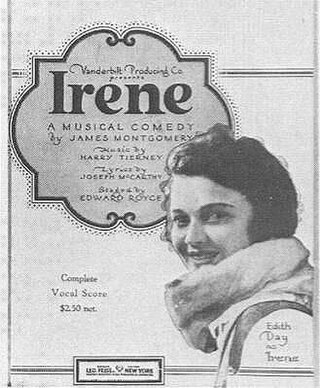
Irene is a musical with a book by James Montgomery, lyrics by Joseph McCarthy, and music by Harry Tierney. Based on Montgomery's play Irene O'Dare, it is set in New York City's Upper West Side and focuses on immigrant shop assistant Irene O'Dare, who is introduced to Long Island's high society when she is hired by one of its leading grande dames to help redecorate her home.
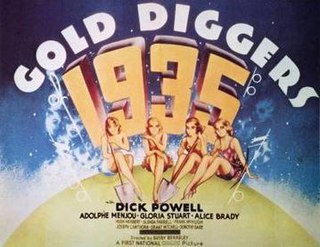
Gold Diggers of 1935 is an American musical film directed and choreographed by Busby Berkeley, his first time as a film's overall director. It stars Dick Powell, Adolphe Menjou, Gloria Stuart, Alice Brady, Hugh Herbert, Glenda Farrell, and Frank McHugh, and features Joseph Cawthorn, Grant Mitchell, Dorothy Dare, and Winifred Shaw. The songs were written by Harry Warren (music) and Al Dubin (lyrics). The film is best known for its famous "Lullaby of Broadway" production number. That song, sung by Shaw, also won the Academy Award for Best Original Song. The screenplay was by Manuel Seff and Peter Milne, based on a story by Robert Lord, who also produced the film, and Milne.

The German Reed Entertainments were founded in 1855 and operated by Thomas German Reed (1817–1888) together with his wife, Priscilla German Reed (1818–1895). At a time when the theatre in London was seen as a disreputable place, the German Reed family provided family-friendly entertainments for forty years, showing that respectable theatre could be popular.
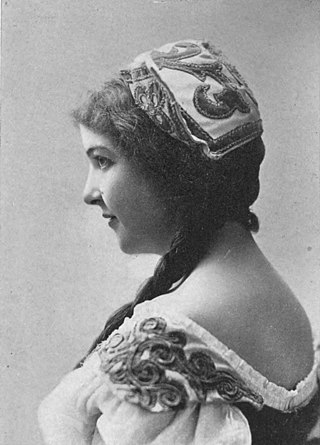
Alice Nielsen was an American Broadway performer and operatic soprano who had her own opera company and starred in several Victor Herbert operettas.

"Bombay" Jayashri Ramnath is an Indian Carnatic vocalist, singer, and musician. She has sung in multiple languages including Tamil, Telugu, Kannada, Malayalam and Hindi movies. Born into a family of musicians, Jayashri represents the fourth generation of music practitioners in her family. Trained by Lalgudi Jayaraman and T.R. Balamani, she was awarded India's fourth highest civilian award, the Padma Shri, in 2021. She has become one of the most sought after Carnatic musicians today.

Alexa Blair Wilkinson is an American singer-songwriter, guitarist and trumpet player. As a solo artist from 2006 to 2011, she recorded two full-length albums, and one EP. She is now a member of the band, "Mother's Daughter" with Jessie Standafer. While solo, she toured with a number of indie musicians, including Josh Kelley, Ingrid Michaelson, Joshua Radin, Jonathan Clay, Vanessa Carlton and Kate Voegele,. Alexa Wilkinson's song, 'Miles Away' was featured on MTV's The Hills.
Alice Cushing Donaldson Riley was an American author and arts club founder. She is known for her children's poetry, stories, books, songs, and several one-act plays. She established art clubs and art centers in Illinois, including the Riley Circle, which led to the Drama Club of Evanston; she also inspired the Drama League of America, was a charter club member of the Garden Club of Evanston, and co-founded the Evanston Arts Center.
Svetlana Nesterova is a Russian composer and violinist. Since 2002 she has served on the musical instrument faculty at the Saint Petersburg Conservatory.

Caroline Alice, Lady Elgar was an English author of verse and prose fiction, who married the composer Edward Elgar.
Amy ElsieHorrocks was an English music educator, composer and pianist. She was born to English parents and Hannah Horrocks in Rio Grande do Sul, Brazil, and in 1882 studied piano and composition at the Royal Academy of Music with Adolf Schlösser and Francis William Davenport. She won the Potter Exhibition prize in 1888 and the Bennett Prize in 1889. After completing her studies, she performed as a pianist and taught music in London. There are claims that she was proposed to by Sir Henry Wood, whom she turned down. One of her compositions, Romaunt of the Page, had its premiere at one of the Promenade Concerts on 6 October 1899.

Alice Mary Barth was an English operatic soprano who for some years was a member of the Carl Rosa Opera Company and who during the 1880s managed her own troupe, the Alice Barth Opera Company.
Harriet Priscilla Sawyer Achorn was an American composer who wrote mostly songs and some educational pieces for children. She was also known as Hattie, and published most of her music under the name Harriet P. Sawyer.















